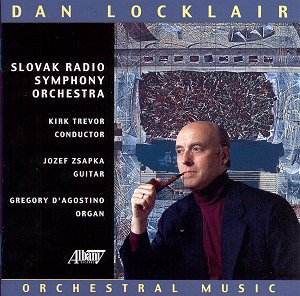Dan Locklair is the composer in residence and Professor
of Music at Wake Forest University in Winston-Salem, North Carolina.
He trained at the School of Sacred Music at Union Theological Seminary
in New York and at the Eastman School of Music in Rochester, New York.
His CV is undeniably extensive but he is a name that is new to me. Rather
more worryingly, I have never heard of any of the people that he studied
with, such is the insularity of our Western European musical tradition.
This CD contains a number of his orchestral works written between 1984
and 1995.
Locklair writes attractive, tonal music made distinctive
by spicy harmonies and a fondness for rhythmic figures and ostinatos.
His music evokes many influences, but always wrapped in his own voice.
His music feels rather filmicly descriptive, but which asks a bit more
of the listener. I can see why his CV lists so many performances and
commissions, his is music which never alienates the listener but which
tries not to underestimate them either.
'HUES' is a trio of short tone poems.
The first makes much of repeated rhythmical figures; such jazzy ostinatos
are a feature of Locklair's music. In this movement the sonorities often
approach those of John Adams. The middle movement is more relaxed but
in the final movement the ostinatos return, ultimately with a chorale
underneath (again, this combination of ostinato and chorale is one that
recurs on the disc).
'Dayspring' is described as a ‘Fanfare/Concertino
for Guitar and Orchestra’. Guitar concertos are always a problem, as
the balance remains tricky. For this work, it sounds as if the recording
engineers have recorded the guitar rather closer than the rest of the
orchestra. This has the effect of falsifying the balance and doing unfortunate
things to the guitar sound. Though described as a Fanfare, this
is actually quite a low key piece. Locklair's rhythmical figures are
rather more understated and the orchestra rarely gets a chance to dominate
for long. Audibility for the guitar necessitates solo passages. passages
with lightly scored woodwind and rather effective percussion. Inevitably
the spectre of Rodrigo wanders in and out of the proceedings, never
being entirely exorcised. Despite the solo part being balanced by the
recording engineers, guitarist Jozef Zsapka never seems to dominate
proceedings though he plays admirably.
'In Autumn Days (A Symphony for Chamber Orchestra)'
is arranged in five short movements which play without a break.
The opening movement, with its jazzy tunes and rhythmic chords, uses
rather Ives-like sonorities. The relaxed second movement leads to the
third, in which a piano ostinato is counter-pointed with a chorale-type
figure.
'Creation's seeing Order (A Prelude for Orchestra)'
is based on a pun as the work is centred around the note C. The
noisy opening develops into a series of powerful interlocking ostinatos
propelled by a powerful forward motion.
'Ere long we shall see… (Concerto Brevis
for Organ and Orchestra)' is a one movement work written for the
Centennial Convention of the American Guild of Organists. The rather
poetic title, in fact, comes from a brief essay "What the Guild of Organists
Means for the Profession" written by on of the AGO founders. The piece
was premiered by Gregory D'Agostino who plays the solo part here. The
composer states in his programme note that all the musical material
is based on the initials AGO (the musical notes A, G and B), but this
piece is no dry dissertation. In fact, I was struck by how Locklair
(himself an organist) has managed to make the organ partake in the rather
jazzy musical material without it sounding incongruous. This is certainly
no clash of the titans, and sometimes the organ simply adds discreet
concertante colouring. But Gregory D'Agostino acquits himself well and
is crisply rhythmic when needed.
The final piece on the disc, 'When Morning Stars
Begin to Fall (A Tone Poem for Orchestra)'. The title comes
from an old Southern pentatonic folk tune, 'When the Stars Begin to
Fall', collected in Carolina in the 1930s. This embodies a number of
influences in Locklair's music; he is Carolina based and was born there
and pentatonic scales are another of the recurring motifs in the music
on this disc.
This anthology was recorded in the presence of the
composer. As with all such discs, I would rather like to know what the
basis was for the choice of pieces. Dr. Locklair writes some admirable
programme notes in the booklet, but nothing is said about why these
pieces were chosen. Were they, in Dr. Locklair's view, his best orchestral
pieces or perhaps just the most suitable for the forces available. It
would be nice to know.
The Slovak Radio Symphony Orchestra plays this music
admirably. Though no modernist, Dr. Locklair's scores are substantial
and complex. It is no easy task performing over sixty minutes of entirely
new music. The orchestra come out of the task very well, notwithstanding
one or two small slips. The conductor Kirk Trevor is Principal Guest
Conductor of the Slovak Radio Symphony Orchestra and this recording
is part of an ongoing series of recordings of new American music. Trevor
obviously has a strong commitment to this new music and on this disc
he is admirably in control of Locklair's sometimes complex textures.
Most of the pieces here are either short movements
or longer pieces constructed from shorter sections. I would have liked
to have heard something with a rather longer breathed structure. Though
attractive and well made, I felt that on repeated listening I was also
missing something else, call it passion - the need for the music to
be the way it is, that something that lies beneath the surface. But
there is plenty to enjoy in this well crafted music, spiced with pentatonic
scales and quarter-tones and jazzy rhythms.
Robert Hugill
